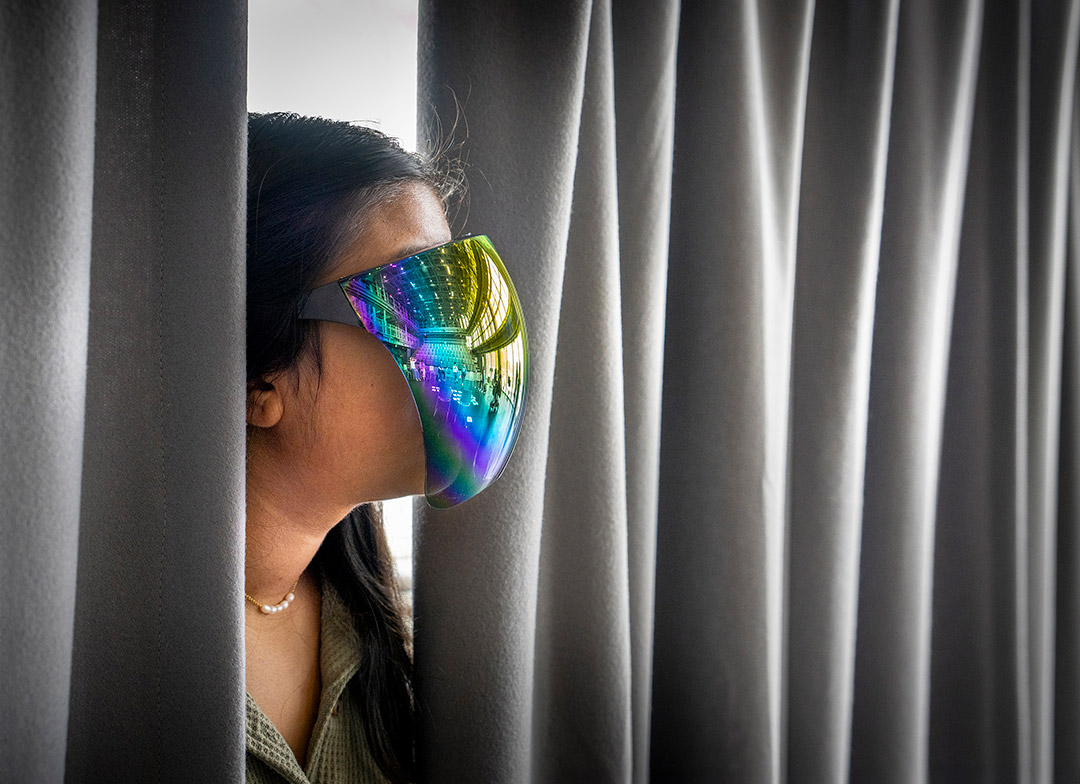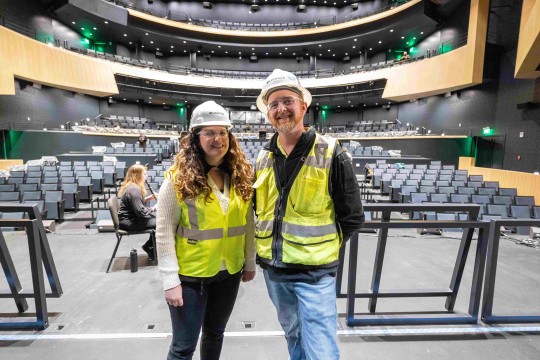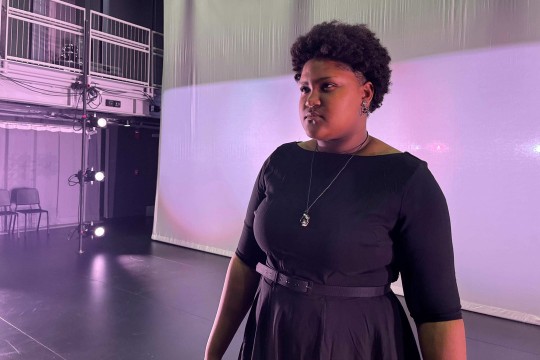‘The Machine’ offers an immersive theater experience
Audience members will wear masks and freely roam among 11 actors
Carlos Ortiz/RIT
Every audience member for the ‘The Machine’ will wear a full reflective facemask for the production. The immersive production encourages the audience to roam freely among the cast as they wish.
Audience members attending The Machine won’t just watch a show in RIT’s Sklarsky Glass Box Theater. They’ll be part of it.
The original play, written by the 11 student actors performing silent pieces to convey a dystopian mechanical world, will also feature audience members, each given a mirror mask to wear, as they explore spaces and events among the actors in any way they choose.
The 90-minute immersive theater production, part of the RIT Performing Arts season, will be held at 7:30 p.m. April 11 through 14 in the SHED.
“This isn’t improv,” said Ryan Underbakke, a visiting assistant professor and the play’s director. Instead, each character has had a journey inside the mysterious, luring machine. It is up to the audience members to roam as they wish to visit the characters and learn what they have to say.
But they aren’t verbally saying anything. No one is.
Provided
Miles Sopchak
“All of these characters are very isolated for the most part,” Underbakke said. “The actors are going to engage with the audience like out of focus ghosts.”
Before the play begins, rules are announced.
“We ask the audience not to touch the performers, and the performers will not touch you,” Underbakke said.
And each audience member— 30 per show— will be given a reflective face mask to wear throughout the performance, and keep afterward.
“Those mirror masks are a bit terrifying because you can’t see a face,” Underbakke said. “Many people don’t think they’d like the concept of immersive theater because they wonder if they have to do something. They may not want to go to a play and act. But normally you don’t act like yourself when your face is covered.”
Underbakke worked with immersive theater in London more than a decade ago with the Punchdrunk Theatre. It differs from traditional theater in that the stage becomes the entre environment, immersing the audience in the performance itself.
This venue at RIT offers the ability to use projections, audio cues, and take performances in side rooms to act out small vignettes. Other RIT students from Visiting Assistant Professor Joel Hunt’s History of Electronic Music and Composing for Video Games classes composed music for the show.
One of the characters is dressed in 18th-century clothing because that’s when he entered the machine, and one character believes they are in the 1980s, complete with a Nintendo game.
Miles Sopchak, a second-year computer science major from Reading, Mass., is portraying Harold Parker, a businessman from the 1980s.
“A function of the machine is that it recruits people to it,”Sopchak said. “Harold Parker is a pretty intelligent guy, and the machine fabricates his life with a wife and kid he thinks are his, but in reality, they never really existed. In his search for them, he is led to the machine.”
Sopchak said he’s learned to convey his story without words from workshops.
“There’s a lot of emotion that just comes from the face,” he said. “The eyes say a lot. There are no words, but there are a bunch of props that have things written on them, and the audience is free to pick them up and look them over.”
Provided
Maddi Trist
Maddi Trist, a second-year ASL-English interpretation major from Los Angeles, is one of the actors and plays “The Object,” a character of their creation.
“It’s something that is certainly not quite human, and not quite alive. It is, perhaps, something that’s never existed at all,” they said. “It took a lot of brainstorming and discussion with my fellow actors. Every time we met at rehearsal, we would come up with scenes and present them, finding out what worked and what didn’t.”
Trist hopes audience members will come away “with a sense of wonder, or their own interpretation of the many stories our show portrayed,” they said. “I hope that, if they so choose, they can put their heads together and trade experiences to figure out what exactly happened. Most importantly, I hope that it is a truly unique experience like no other show they have ever experienced.”
Tickets may be purchased through University Arenas box office for $12; $10 for faculty, staff, and alumni; and $5 for RIT students.





